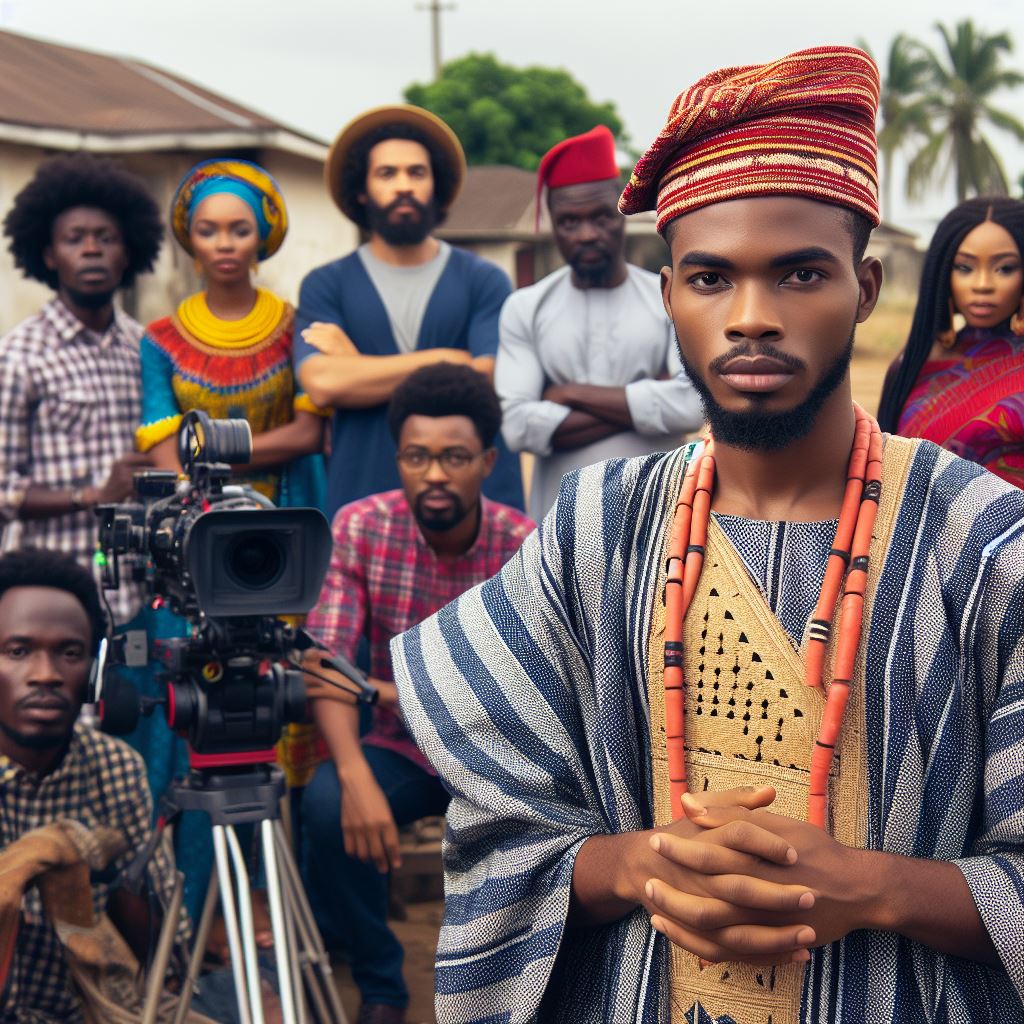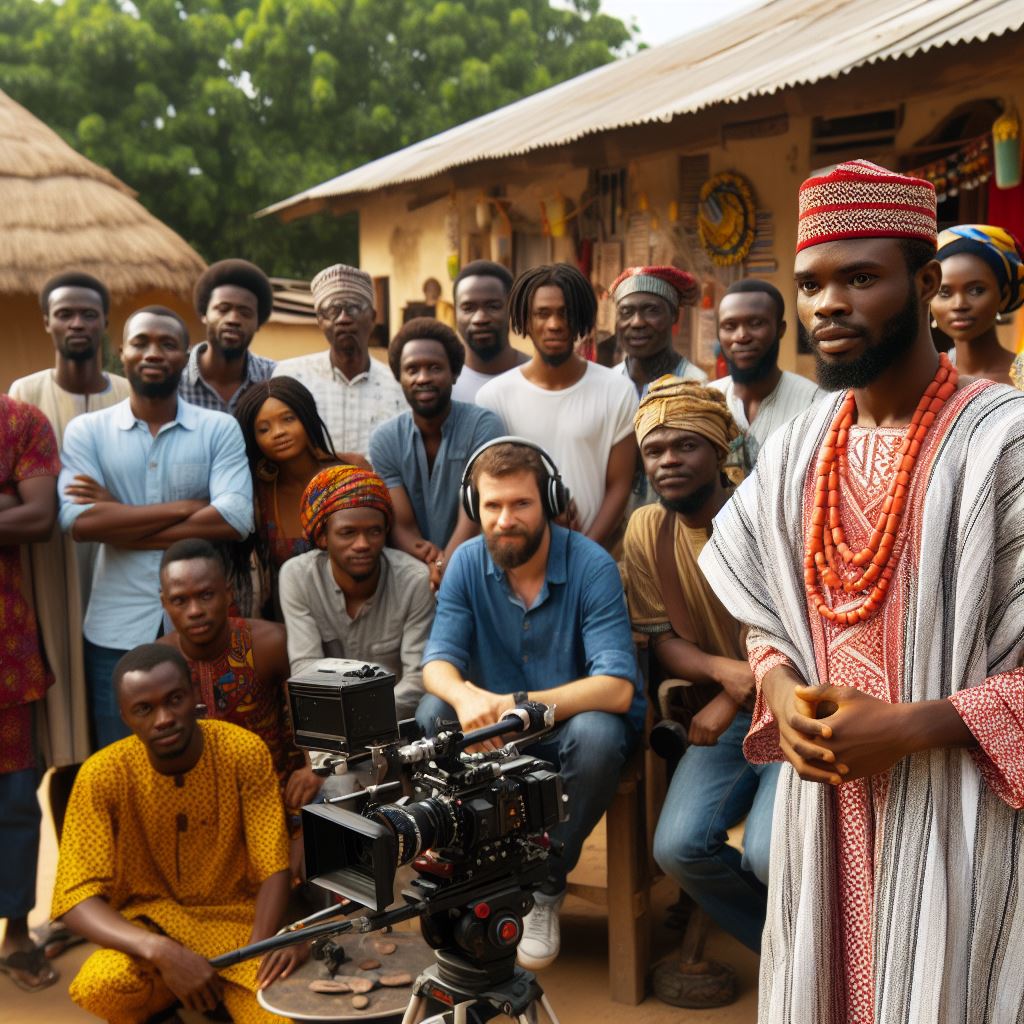Introduction
Nigeria’s fashion industry burgeons with creativity, blending tradition and modernity into vibrant styles. Technology’s integration catalyzes this evolution.
Overview of Nigerian Fashion Design
Nigeria’s fashion scene is a colorful tapestry, reflecting diverse cultures, traditions, and contemporary influences.
From the elegant attire of the Yoruba people to the intricately woven fabrics of the Igbo, Nigerian fashion embodies rich heritage and innovation.
The Influence of Technology
In recent years, technology has become a driving force behind the transformation of the Nigerian fashion design landscape. From design conception to marketing and distribution, technology permeates every facet of the industry.
Design and Production
Technology revolutionizes the design process, enabling designers to experiment with digital tools for pattern making, prototyping, and visualization.
Computer-aided design (CAD) software empowers designers to translate their creative visions into precise digital blueprints, accelerating the prototyping process and minimizing errors.
Sourcing and Material Innovation
Technological advancements facilitate access to a wide array of materials and textiles, both locally and globally.
Online platforms and digital marketplaces connect designers with suppliers, fostering collaboration and streamlining the sourcing process.
Furthermore, innovations in fabric technology, such as sustainable materials and smart textiles, offer new avenues for creativity and sustainability in Nigerian fashion design.
Marketing and Branding
In the digital age, technology has reshaped the way Nigerian fashion designers market and promote their brands.
Social media platforms serve as powerful tools for showcasing collections, engaging with audiences, and building brand identities.
E-commerce platforms enable designers to reach a broader market, transcending geographical boundaries and expanding their customer base.
Supply Chain Management
Technology plays a pivotal role in optimizing supply chain management within the Nigerian fashion industry.
Inventory management systems, logistics software, and data analytics tools enhance efficiency, minimize costs, and improve overall operational performance.
This streamlined approach ensures timely delivery of products and enhances customer satisfaction.
Thesis Statement
In essence, technology serves as a catalyst for innovation, creativity, and growth within the Nigerian fashion design industry.
Its integration not only enhances efficiency and scalability but also empowers designers to redefine traditional narratives and propel Nigerian fashion onto the global stage.
History of Nigerian Fashion Design
Evolution of Nigerian Fashion Design
Nigerian fashion has a rich history that dates back to ancient times. Traditionally, Nigerians wore clothing made from locally sourced materials such as cotton, silk, and jute.
These fabrics were dyed using natural dyes made from plants and minerals. The clothing styles were influenced by the diverse cultures and ethnic groups in Nigeria, each having its unique way of dressing.
Traditional Clothing Styles and Fabrics
Traditional Nigerian clothing styles vary depending on the region and culture. For example, the Yoruba people are known for their colorful and elaborate Aso-Oke fabric, while the Igbo people have the Isi Agu fabric with intricate embroidery.
The Hausa people, on the other hand, are recognized for their flowing Boubou robes made from colorful and patterned fabrics.
Transition to Modern Fashion
In recent years, Nigerian fashion has undergone a significant transformation, merging traditional styles with modern influences.
This transition has been greatly influenced by technology, which has enabled designers to experiment with new fabrics, techniques, and designs.
The use of technology in Nigerian fashion design has revolutionized the industry, making it more dynamic, innovative, and accessible to a global audience.
Role of Technology in Nigerian Fashion Design
Technology plays a crucial role in shaping the landscape of Nigerian fashion design.
Designers now have access to advanced tools and software that allow them to create and visualize their designs in a virtual environment before bringing them to life.
This has streamlined the design process, making it faster and more efficient.
Impact of Technology on Fabric Production
The advent of technology has also had a profound impact on fabric production in Nigeria.
Traditional methods of fabric production have been modernized, with the introduction of mechanized looms, digital printing, and automated cutting machines.
This has resulted in higher quality fabrics, increased production efficiency, and reduced costs, making Nigerian fashion more competitive in the global market.
E-commerce and Social Media in Nigerian Fashion
The rise of e-commerce and social media platforms has transformed the way Nigerian fashion designers reach their audience.
Designers can now showcase their collections online, reach customers worldwide, and engage with their audience in real-time. This has opened up new opportunities for designers to market their brands and grow their businesses.
Essentially, technology has played a significant role in shaping Nigerian fashion design, from the evolution of traditional clothing styles to the modernization of fabric production and the rise of e-commerce and social media platforms.
As technology continues to advance, Nigerian fashion design will undoubtedly continue to evolve, adapting to new trends and technologies to stay relevant in the global fashion industry.
Read: Internship Opportunities for Communication Arts Students
Technology in Fabric Production
Technology has significantly impacted fabric manufacturing in Nigeria, revolutionizing the industry and leading to innovative practices.
The introduction of new techniques and materials has brought about a shift in the way fabrics are produced and utilized in the fashion design sector.
Impact of technology on fabric manufacturing in Nigeria
Advancements in technology have played a crucial role in improving the efficiency of fabric production in Nigeria.
From the spinning of yarn to the weaving of textiles, technology has streamlined the manufacturing process, resulting in higher quality fabrics being produced at a faster rate.
This has not only enhanced the overall productivity of fabric production but has also made it possible for designers to access a wide range of high-quality materials to work with.
Introduction of new techniques and materials in fabric production
The fashion design industry in Nigeria has witnessed a wave of creativity and innovation, thanks to the introduction of new techniques and materials in fabric production.
Technology has enabled designers to experiment with unconventional materials and production methods, resulting in unique and cutting-edge fabrics that have set new trends in the fashion world.
This infusion of technology into fabric production has opened up endless possibilities for designers to create one-of-a-kind pieces that stand out in the industry.
Collaboration between technology companies and fashion designers to create innovative fabrics
A key trend that has emerged in recent years is the collaboration between technology companies and fashion designers to create innovative fabrics.
These partnerships have led to the development of fabrics that incorporate technology, such as smart textiles that can adapt to different environments or respond to the wearer’s needs.
By harnessing the power of technology, designers are pushing the boundaries of what is possible in fabric production and creating garments that not only look stunning but also offer functionality and practicality.
Basically, technology has brought about a significant transformation in fabric production in Nigeria.
The marriage of traditional craftsmanship with modern technology has given rise to a new era of creativity and innovation in the fashion design industry.
As designers continue to explore the possibilities that technology offers, we can expect to see more groundbreaking fabrics that will shape the future of Nigerian fashion.
Read: Impact of Communication Arts on Nigerian Media
Digital Design Tools: Revolutionizing Nigerian Fashion
In the dynamic world of Nigerian fashion, technology is reshaping the landscape, empowering designers with innovative digital tools. These tools offer unparalleled precision, efficiency, and creativity, revolutionizing the design process.
Harnessing Digital Design Software
Gone are the days of traditional pen and paper sketches. Nigerian fashion designers are embracing digital design software like never before.
Platforms such as Adobe Illustrator, CorelDRAW, and AutoCAD have become indispensable in creating intricate fashion sketches and patterns.
With these tools, designers can unleash their creativity without limitations. They can effortlessly experiment with colors, textures, and shapes, bringing their visions to life in stunning detail.
The intuitive interfaces of these software programs make it easier for designers to translate their ideas into digital reality.
Efficiency and Accuracy at Its Finest
The use of digital design tools offers unparalleled efficiency and accuracy in the fashion design process.
Tasks that once took days or weeks can now be completed in a fraction of the time, thanks to features like digital sketching, pattern drafting, and 3D modeling.
Designers can easily make adjustments and revisions on the fly, ensuring that every detail is perfect before production. This not only saves time but also minimizes material wastage and reduces the risk of errors.
The precision afforded by digital tools results in garments that fit impeccably and meet the highest standards of quality.
Empowering Nigerian Designers through Training Programs
Recognizing the transformative potential of digital design tools, various training programs have emerged to enhance the skills of Nigerian fashion designers.
These programs provide comprehensive instruction in the use of digital software, equipping designers with the knowledge and expertise to stay ahead in a competitive industry.
From online courses to workshops and seminars, designers have access to a wealth of resources tailored to their specific needs.
Many organizations, both local and international, offer training programs aimed at bridging the digital divide and fostering innovation within the Nigerian fashion community.
Through these initiatives, designers are not only mastering the technical aspects of digital design but also learning how to integrate technology seamlessly into their creative process.
They are discovering new ways to push boundaries, explore unconventional concepts, and challenge traditional norms.
In general, the role of technology in Nigerian fashion design cannot be overstated. Digital design tools have ushered in a new era of creativity, efficiency, and empowerment.
As designers continue to embrace these tools and undergo training to enhance their skills, the Nigerian fashion industry is poised for unprecedented growth and innovation.
Read: Communication Arts: Job Prospects and Salaries

E-Commerce and Online Platforms
In the bustling world of Nigerian fashion design, the advent of e-commerce platforms has sparked a transformative wave.
Designers are harnessing the power of digital marketplaces to expand their reach beyond borders, revolutionizing the industry landscape.
Growth of E-Commerce Platforms for Nigerian Fashion Designers
E-commerce platforms have become the cornerstone of Nigerian fashion designers’ success stories. These platforms provide a virtual storefront, offering designers a direct channel to showcase their creations to a global audience.
Empowering Nigerian Designers
The emergence of e-commerce has democratized fashion, empowering Nigerian designers to compete on a level playing field with their international counterparts.
With just a few clicks, designers can connect with customers worldwide, transcending geographical boundaries.
Global Reach and Accessibility Through Online Platforms
Online platforms serve as a gateway to the global market, allowing Nigerian designers to showcase their unique cultural heritage and craftsmanship to a diverse audience.
Through captivating visuals and compelling storytelling, designers can captivate the attention of fashion enthusiasts worldwide.
Breaking Barriers
E-commerce platforms have shattered traditional barriers to entry, enabling Nigerian designers to bypass the limitations of physical retail.
With the click of a button, designers can reach customers in distant corners of the globe, fostering cultural exchange and appreciation.
Challenges and Opportunities for Nigerian Designers in the Digital Marketplace
While e-commerce presents a plethora of opportunities, Nigerian designers also face unique challenges in navigating the digital marketplace.
From logistical hurdles to fierce competition, designers must adapt to thrive in this dynamic ecosystem.
Logistical Complexities
One of the primary challenges Nigerian designers encounter in the digital marketplace is navigating complex logistical processes.
From shipping to customs clearance, designers must streamline operations to ensure seamless delivery to customers worldwide.
Overcoming Cultural Barriers
In a global marketplace, Nigerian designers must navigate cultural nuances to resonate with diverse audiences. By embracing inclusivity and diversity, designers can foster meaningful connections with customers from different backgrounds.
Transform Your Career with Expert Guidance
Get personalized mentorship consulting that’s tailored to your unique path. Our expert advice is actionable and exclusive.
Get StartedFierce Competition
The digital marketplace is saturated with countless fashion brands vying for consumers’ attention. Nigerian designers must distinguish themselves through innovation, quality, and compelling branding to stand out amidst the competition.
In essence, e-commerce platforms have revolutionized the Nigerian fashion industry, offering designers unprecedented opportunities for growth and global exposure.
While challenges persist, the digital marketplace presents Nigerian designers with a platform to showcase their creativity, culture, and craftsmanship on a global stage.
By harnessing the power of technology and embracing digital innovation, Nigerian designers can carve out a distinctive presence in the ever-evolving world of fashion.
Read: Digital Media Trends in Communication Arts
Social Media and Marketing
Importance of Social Media in Promoting Nigerian Fashion Brands
Social media is vital in promoting Nigerian fashion brands. It offers a platform for visibility and global reach. Nigerian designers use social media to showcase their creativity and unique styles.
Platforms like Instagram, Facebook, and Twitter help designers connect with a broader audience. These platforms also enable real-time interaction with followers.
This engagement builds a loyal customer base and enhances brand awareness. Social media’s visual nature is perfect for displaying the vibrant and diverse Nigerian fashion.
Through posts, stories, and reels, designers can captivate potential customers worldwide.
Leveraging Technology for Marketing and Branding Strategies
Technology is revolutionizing marketing and branding strategies in Nigerian fashion. Designers use analytics to understand their audience better.
Tools like Google Analytics and social media insights provide valuable data. This data helps tailor marketing campaigns to specific demographics.
Email marketing platforms keep customers informed about new collections and promotions.
Social media ads target precise audiences, increasing the chances of conversion. Influencer marketing is another powerful strategy. Collaborating with influencers expands reach and credibility.
E-commerce platforms and websites are also crucial. They provide a seamless shopping experience for customers.
Case Studies of Successful Nigerian Fashion Designers Using Social Media Effectively
Lisa Folawiyo
Lisa Folawiyo, a renowned Nigerian designer, uses Instagram masterfully. Her posts showcase her intricate designs and craftsmanship.
She uses Instagram stories to give a behind-the-scenes look at her creative process. This transparency builds a connection with her audience.
Folawiyo’s strategic use of hashtags increases her visibility. She also collaborates with international influencers. This collaboration has boosted her brand’s global presence.
Orange Culture
Adebayo Oke-Lawal of Orange Culture effectively uses social media for storytelling. His brand’s Instagram feed is a blend of fashion and personal stories. This unique approach resonates with his audience.
He uses Instagram Live to engage directly with followers. Oke-Lawal also leverages user-generated content. Encouraging customers to share their Orange Culture looks creates community and loyalty.
His consistent branding across all platforms strengthens his brand identity.
Deola Sagoe
Deola Sagoe, a veteran in Nigerian fashion, has embraced social media wholeheartedly. She uses Facebook and Instagram to showcase her luxury designs.
Her posts highlight the intricate details of her work. Sagoe uses social media to announce new collections and fashion shows. She also engages with her audience through comments and direct messages.
Her active online presence has kept her brand relevant and admired.
In a nutshell, Social media is indispensable for Nigerian fashion brands. It enhances visibility, engagement, and global reach. Leveraging technology for marketing and branding is crucial for success.
Tools like analytics, social media ads, and influencer collaborations drive growth.
Nigerian designers like Lisa Folawiyo, Adebayo Oke-Lawal, and Deola Sagoe exemplify effective social media use.
They show that strategic social media use can significantly boost a fashion brand. In a digital age, integrating technology in marketing is not just beneficial; it is essential.
Virtual Fashion Shows and Runway
Shift Towards Virtual Fashion Shows and Digital Runways in Nigeria
Nigerian fashion designers are embracing virtual fashion shows. The COVID-19 pandemic accelerated this shift. Designers found innovative ways to showcase their collections online.
Virtual shows are now a staple in the industry. They offer a broader audience reach compared to physical events.
These shows allow designers to be more creative with presentations. The digital format provides unique experiences for viewers.
Virtual fashion shows have reduced logistical challenges. Designers no longer need to worry about venue costs and limitations.
This change has made fashion more accessible. More emerging designers can now showcase their work.
The virtual format has also increased global visibility. Nigerian fashion is now on a world stage more than ever before.
Collaboration with Tech Companies for Virtual Show Production
Tech companies play a crucial role in virtual fashion shows.
Nigerian designers collaborate with these companies for seamless productions. These collaborations bring together fashion and technology experts. The result is high-quality virtual experiences.
Production companies provide the necessary tools and platforms. They help designers create interactive and immersive shows. These partnerships also bring innovation to the fashion industry.
Technologies like augmented reality (AR) and virtual reality (VR) are now common. They make fashion shows more engaging and exciting for audiences.
Tech companies also offer solutions for live streaming. This ensures that virtual shows reach a wide audience in real-time.
The collaboration between fashion and tech enhances the overall quality of the shows. It also opens up new possibilities for future innovations.
Reach and Impact of Virtual Shows on the Nigerian Fashion Industry
Virtual fashion shows have significantly impacted the Nigerian fashion industry. They have democratized fashion shows. Now, anyone with an internet connection can watch.
This has expanded the audience base for Nigerian designers. They can now reach potential customers and fans globally.
The virtual format also offers valuable data. Designers can track viewer engagement and preferences. This information helps them make informed decisions.
They can tailor their collections to meet market demands. The feedback loop from virtual shows is faster and more detailed.
Virtual shows also promote inclusivity. Designers can now showcase more diverse models and styles.
This broadens the representation in Nigerian fashion. It encourages designers to be more innovative and bold.
The impact of virtual shows extends to marketing. Designers can leverage social media and online platforms.
They can create buzz and drive sales directly from the shows. This integrated approach boosts brand visibility and customer engagement.
In review, virtual fashion shows are transforming Nigerian fashion. They offer new opportunities and overcome traditional limitations. The collaboration with tech companies enhances these shows.
The reach and impact of virtual shows are profound. Nigerian fashion designers are now better positioned on the global stage.
Sustainability and Technology
Use of Technology in Sustainable Fashion Practices in Nigeria
Technology is transforming Nigeria’s fashion industry towards sustainability. Designers now leverage digital tools to minimize waste and optimize resources.
One prominent example is the use of 3D printing. This technology allows precise material use, reducing fabric waste. Virtual design software helps create and modify designs before actual production.
This reduces the number of physical prototypes needed, saving both materials and energy.
Online platforms and e-commerce have also contributed significantly. By selling directly to consumers online, designers reduce the need for physical stores.
This approach cuts down on energy consumption associated with maintaining retail spaces. Furthermore, social media and digital marketing have enabled designers to reach broader audiences without traditional marketing materials.
This shift to digital reduces paper waste and the carbon footprint associated with traditional advertising.
Innovation in Eco-Friendly Materials and Production Processes
Innovation in materials is another critical area where technology supports sustainability.
Nigerian designers are exploring alternatives to traditional fabrics. Some are experimenting with organic cotton and bamboo, which have a lower environmental impact.
Additionally, research into biodegradable and recycled materials is gaining momentum. These materials reduce waste and promote a circular economy.
Production processes are also evolving. Technological advancements in dyeing techniques have led to water-saving methods. Digital printing uses less water and energy compared to conventional dyeing processes.
Moreover, designers are adopting renewable energy sources in their production facilities.
Solar power and other renewable energy sources are becoming more common, further reducing the environmental footprint of fashion production.
Challenges and Future Trends in Sustainable Fashion with Technology Integration
Despite these advancements, challenges remain. The high cost of eco-friendly materials and technologies can be prohibitive.
Many Nigerian designers operate on tight budgets, making it difficult to invest in sustainable practices.
Additionally, there is a lack of infrastructure to support large-scale production of sustainable materials.
Education and awareness are also significant barriers. Many consumers are still unaware of the benefits of sustainable fashion.
This lack of awareness limits the demand for eco-friendly products, making it harder for designers to justify the higher costs.
Furthermore, there is a need for more comprehensive policies and incentives from the government to support sustainable practices.
Looking forward, the integration of technology and sustainability in Nigerian fashion is promising. Advances in blockchain technology could ensure transparency in the supply chain.
This technology can verify that materials are sourced sustainably and ethically. Artificial Intelligence (AI) and machine learning could optimize production processes, reducing waste and improving efficiency.
The future also holds potential for greater collaboration among stakeholders.
Designers, tech experts, and environmentalists can work together to develop innovative solutions. Educational institutions can play a vital role by incorporating sustainable fashion and technology into their curricula.
In fact, while challenges exist, the role of technology in promoting sustainability in Nigerian fashion is undeniable.
Continued innovation and collaboration are essential to overcoming these challenges and paving the way for a more sustainable future.
Conclusion
Recap of the Role of Technology in Nigerian Fashion Design
Technology has significantly transformed Nigerian fashion design. It has introduced new tools and platforms for creativity and efficiency. Digital design software enables designers to create intricate patterns and designs with precision.
Social media platforms provide a global stage for showcasing collections and engaging with a broader audience. E-commerce has opened up new markets, allowing designers to reach customers worldwide.
Fabric and textile technologies have revolutionized the production process, ensuring better quality and sustainability.
Overall, technology has become an indispensable part of Nigerian fashion design, enhancing both the creative and business aspects of the industry.
Importance of Embracing Technology for Growth and Innovation in the Industry
Embracing technology is crucial for the growth and innovation of Nigerian fashion. Technology fosters creativity by providing designers with advanced tools and resources.
These tools help designers experiment with new ideas and techniques, pushing the boundaries of traditional fashion. Technology also improves operational efficiency.
Automated processes reduce manual labor, allowing designers to focus on their creative work. Additionally, technology enables better market analysis and customer insights.
Designers can use data analytics to understand trends and consumer preferences, leading to more successful collections.
By embracing technology, Nigerian fashion can compete on a global scale, attracting international attention and investment.
Call to Action for Nigerian Fashion Designers to Leverage Technology for Success
Nigerian fashion designers must leverage technology to achieve success in the modern market. The digital age offers endless opportunities for growth and innovation.
Designers should utilize digital tools to enhance their creative process and streamline operations. Social media should be a key part of their marketing strategy, helping them connect with a global audience.
E-commerce platforms should be used to expand their reach and increase sales. Additionally, designers should invest in fabric and textile technologies to improve the quality and sustainability of their products.
Continuous learning and adaptation are essential in this fast-paced industry. By embracing technology, Nigerian fashion designers can secure a prosperous future.
In closing, technology plays a vital role in Nigerian fashion design. It enhances creativity, efficiency, and global reach, making it indispensable for modern designers.
To stay competitive and innovative, it is crucial for Nigerian fashion designers to embrace and leverage technology.
This will not only ensure their growth but also elevate the Nigerian fashion industry on the global stage.
The call to action is clear: adopt technology, harness its potential, and lead the future of fashion in Nigeria.




